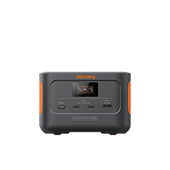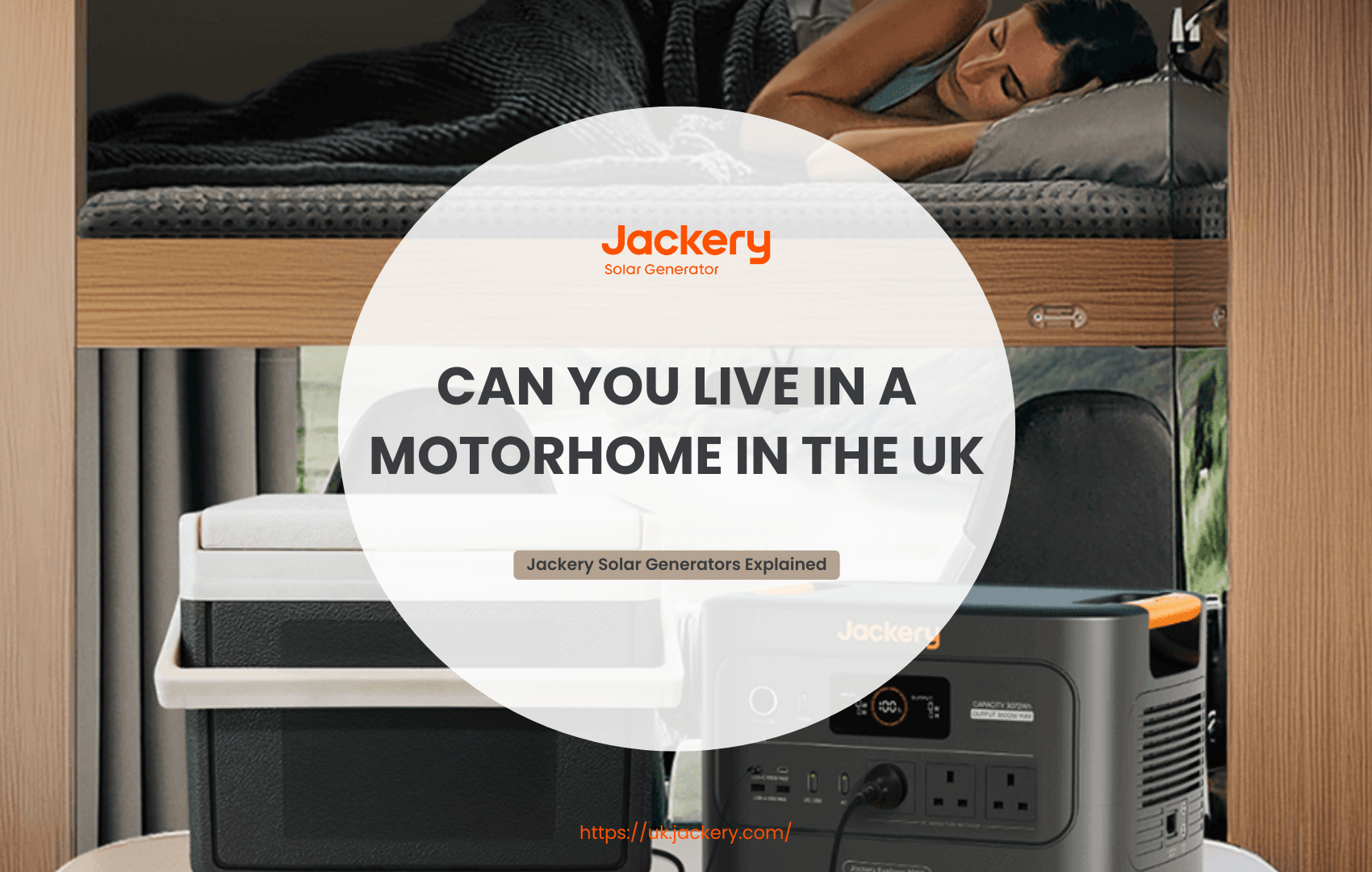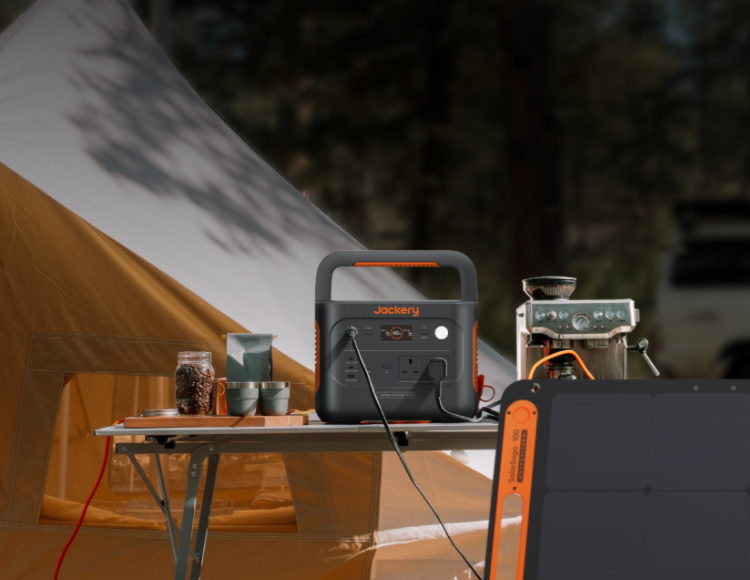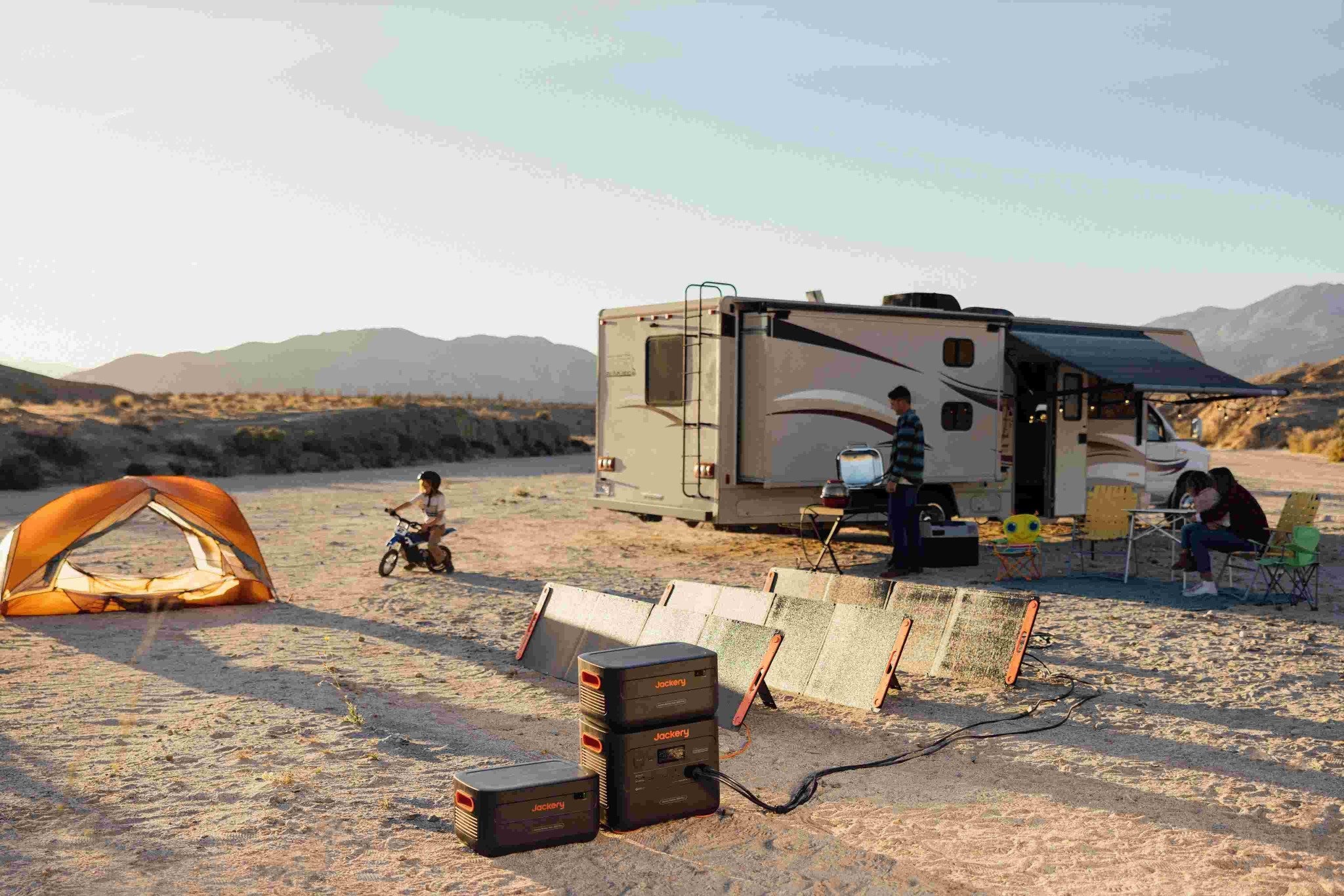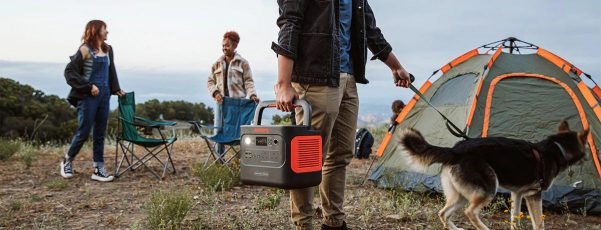Do you want to know if you can live in a motorhome in the UK full-time? You're not the only one. Many people are considering this alternative way of living because house expenses are increasing, and the idea of living on the go is appealing. It is perfectly legal to live in a campervan in the UK, provided your vehicle is roadworthy and you are aware of the local regulations.
This guide provides everything you need to know, from obtaining permission to build to practical advice on heating, parking, and budgeting. If you want to live in a motorhome full-time in the UK, whether you're a digital nomad, a retiree, or want to be free, here's how to accomplish it.
Moreover, when considering the utilities for living in a motorhome, especially the electricity. We highly recommend the Jackery Solar Generator, a portable solar system, to power your motorhome appliances with solar energy.
|
Key Takeaways: |
|
● It is legal to live in your motorhome or campervan full-time in the United Kingdom, as long as: You have the legal right to live in the UK, and your campervan or motorhome is road-legal. ● Depending on where you live in the UK, you may require planning permission to operate a motorhome as a permanent residence. ● Be wary of any legal constraints or restrictions on motorhome living, since they can deflate your romantic dream of parking your snug camper on your land in the UK. ● When you add up fuel, food, maintenance bills, insurance, tolls, repairs, laundry, and site fees, you should expect to pay between £700 and £1,500 per month to live in a motorhome full-time. ● We highly recommend the Jackery Solar Generator 3000 v2 and 2000 v2 for powering motorhome appliances outdoors or in the vehicle, as they offer higher capacities. |
Is It Legal to Live in a Motorhome?
An increasing number of individuals in the UK and Europe are wondering if full-time life in a motorhome is a viable option. On the one hand, having no fixed address may seem problematic in legal terms, but on the other hand, life on the road can be viewed as the ultimate form of freedom.
Is It Legal To Live In a Motorhome Permanently In The UK?
Yes, it is legal to live in your motorhome or campervan full-time in the United Kingdom, as long as: You have the legal right to live in the UK, and your campervan or motorhome is road-legal. This implies that it has been taxed, insured, and registered with the DVLA, has a valid MOT (if required), and you hold a valid driver's licence.
How Long Can You Live In a Motorhome?
Except for some vehicle off-road limitations and campsite availability, there are no restrictions on living in a motorhome year-round. Despite your best efforts, you cannot park on private land, including lay-bys. Therefore, you must always park in caravan parks, which can be challenging to find during the winter months.
You should also be aware that caravan parks do not have a legislative minimum quality requirement, which means you may be without electricity and fresh water at some sites. When it's freezing outside and you need warmth and water, this won't make your journey particularly magical. Otherwise, it is entirely allowed to live full-time in a motorhome.
The Relative Laws And Regulations
Be wary of any legal constraints or restrictions on motorhome living, since they can deflate your romantic dream of parking your snug camper on your land in the UK. Before entering into any living arrangement, ensure you are aware of the local laws and regulations that apply to you.
Some places may have zoning rules that prevent long-term RV habitation, even if you own the site. There may also be time limits on how long you can stay in a motorhome, as well as requirements for getting licenses or planning permission. Failing to comply with these legal constraints can result in penalties, legal issues, or even forced eviction from your property.
Furthermore, be mindful of any utility or waste management constraints. Some locations may require you to connect your RV to the municipal water and sewage systems, while others may impose waste disposal requirements. Understanding these constraints will allow you to plan for the practical issues of living in a motorhome on your land.
It is equally critical to consider the effects on your neighbours and the environment. Noise limits, visual effects, and potential environmental concerns are all factors to consider. By being informed of any legal constraints or restrictions on motorhome living, you can have a more comfortable experience when living in your cosy camper on your land in the United Kingdom.

The Pros and Cons of Living in a Motorhome
If you're wondering what the benefits and drawbacks of leaving your warm house in favour of motorhome living and never-ending travel are, you've come to the correct spot. We've compiled a list of the most significant advantages and cons to help you comprehend this concept, even if you've never heard of nomads living in a motorhome in the UK.
The Advantages of Living in a Motorhome
The advantages of living in a campervan include:
The Ability To Travel Freely
This is frequently the primary reason why individuals choose to live in a campervan rather than their homes. You may travel wherever you desire, knowing that you'll have your bed with you.
This means you can choose to wake up to a new vista each morning.
Reduced Living Expenses
Houses are expensive to own—mortgages, rent, utilities, and council tax pile up.
While motorhomes are not inexpensive, they are less expensive to own than traditional homes. You will incur costs such as camp sites, fuel, insurance, and maintenance, but they will be less than those associated with owning and living in a house.
Closer to Nature
There's nothing quite like living outdoors. Being closer to nature improves our mental health. Many people who live in RVs report a better mood, lower anxiety levels, and a happier overall life. Reduces your dependence on the grid supply and gives you more control over your energy.
Less Space to Clean
If you're like us, there are plenty of things you'd rather do than clean. Especially while you're out experiencing the world. The good news is that RVs have little room, making them easier to clean. Even a thorough cleaning takes only a few hours, allowing you more time to accomplish your goals.
The Disadvantages of Living in a Motorhome
The disadvantages to living in a motorhome include:
Limited Room
While having limited room is beneficial if you dislike cleaning, it can be a source of frustration for others. You'll have to share the toilet and bathroom, and your beds will be positioned close together, resulting in limited personal space and privacy.
Furthermore, while motorhomes are efficient in terms of space, storage is often limited. So it doesn't take much to make a small room disorganised.
Driving Can Be Challenging
Motorhomes are large vehicles that can make getting around difficult, especially in unfamiliar locations. If you're not a confident driver, consider purchasing a motorhome as an alternative to driving.
Parking Problems
Parking your motorhome can be challenging, especially in the UK. Different councils have different parking restrictions, so make sure you understand them.
When parking on private property, you must obtain permission from the landowner. There are numerous applications and Facebook groups that can help you find a parking spot.
No Fixed Address
If you choose to live in a motorhome, you will not have a fixed address. This can make other aspects of your life challenging. Collecting mail, registering with a GP surgery or dentist, obtaining insurance, and getting on the electoral roll can be difficult.
One option is to forward your mail to a relative or acquaintance. Other companies rent mailboxes. The motorhoming community is always full of valuable ideas.
Nevertheless, there may be instances when you receive sensitive financial, medical, or other data via mail. As a result, you must take precautions to protect your personal information.

How to Choose a Motorhome?
The best motorhome for you is determined by your unique circumstances, including the distance and frequency of travel, the number of people you will be travelling with, your budget, and your priorities. Before you purchase and commit to a life on the road, you should consider the following:
How Much Space Do You Need?
Although you'll need a motorhome large enough to accommodate everyone and all your belongings, don't go too large, as you'll have difficulties parking and navigating some of the tighter country lanes and highways in the UK and Europe.
If space is crucial to you, an A-Class or C-Class RV is a better option. If cost is your primary issue, a campervan conversion may be the best option. Alternatively, consider investing in a high-quality tent or awning to use as an additional room.
How Far Will You Be Driving?
If you'll be travelling thousands of miles each year, a diesel engine may be more fuel efficient. However, considering that we don't know how long diesel engines will be allowed on the road, it may be worth purchasing a petrol model and having it converted to LPG.
Although LPG engines are not as fuel-efficient as diesel engines, the fuel is often half the price, widely available, and burns cleaner, which can help extend engine life. If there are no LPG stations nearby, you can still drive on petrol until you reach one.
Things to Consider When Living in a Motorhome
While there is no outright ban on living in a motorhome in the UK, several factors should be taken into consideration. Let's go through everything step by step.

Planning Permissions
Depending on where you live in the UK, you may require planning permission to operate a motorhome as a permanent residence. Local governments have regulations governing residential car use, and it is critical to consult with the appropriate council to understand the requirements in your area.
Residential Address
Many official documents and services require a specific residential address. Living in a motorhome may make it more challenging to register for healthcare, receive mail, or maintain a consistent legal and financial address.
Council Tax
This will vary depending on whether you live in your RV permanently or while travelling. If you have a permanent dwelling on a residential caravan park, for example, you are required to pay Council Tax. However, if you are constantly on the move, it will be challenging to pay Council Tax, not to mention that you may not be in the same council authority for very long. If you're unsure, contact your local council.
The Cost
Will you have enough money to support your motorhome lifestyle? It will always cost more than you expect, but living in a campervan is still far less expensive than living in a house. Our essay on prices, money-saving strategies, and tricks for touring in a motorhome can help you create a budget.
Living in a motorhome permanently in the UK will be more expensive than in Europe due to the high cost of campgrounds, a shortage of aires, and the ease of wild camping and off-grid parking.
You may also have to pay to access services that are often free or extremely inexpensive in Europe. Some of this will be mitigated by lower motorhome insurance costs and the elimination of the need for travel insurance if you do not plan to go outside of the UK.
Increasingly, people are opting to live full-time in motorhomes and vans, often working remotely as digital nomads while travelling or staying in one location and commuting to work daily.
TV License
If you do not reside in your motorhome permanently and have a main home address for which you pay a TV license, you do not need to obtain a separate permit for your camper. If your RV or campervan serves as your primary dwelling, you will require a TV license.
Healthcare
Living the itinerant lifestyle in a motorhome can be fantastic, but guaranteeing access to healthcare necessitates some extra planning. Here's how you can navigate healthcare issues when travelling around the UK on wheels:
|
Registration & Access of GP |
|
|
GP Registration |
While most GP surgeries in the UK require a permanent address, some are becoming more flexible. Use internet resources, such as the NHS website, to find GP surgeries that will register patients with "no fixed abode" status. You may be required to provide proof of travel insurance or other documentation to confirm your residency in the UK. |
|
Temporary Registration |
If finding a GP surgery ready to register you is problematic, consider registering with a local surgery for a limited time. This could be particularly useful if you intend to stay in one location for an extended period. |
If NHS options are limited, you may opt for private healthcare. Keep in mind, however, that private healthcare is not free of charge. Walk-in clinics can be a convenient way to treat minor symptoms. These clinics primarily address non-urgent issues and may be offered in various settings.
Use NHS 111 for non-emergency circumstances that require medical advice. This service offers 24-hour phone consultations with qualified advisors who can direct you to the most suitable care option, whether it's a GP appointment, self-care guidance, or an emergency referral.
Essential Tips for Living in a Motorhome
Living in a motorhome in the UK is entirely possible—but it requires careful planning, sensible daily routines, and a thorough understanding of the law. Whether you want to travel or dwell semi-permanently, here are some pointers to help you live comfortably, safely, and productively.

Tip 1: Set Up Your Utilities Before Moving in
Begin by thoroughly cleansing, draining, and sanitising the complete water system, including the fresh, grey, and black tanks. This ensures that your supplies are safe and clean before you hit the road. Run water through the faucets and showerheads, inspect the filters and pump connections, and check for airlocks.
To prevent freezing damage during the winter months, drain all water tanks and leave the taps open. Add antifreeze as needed, and use built-in heaters or blowers to remove moisture from pipes.
Use a 25m 16A blue cable for Electric Hook-Up (EHU) at campgrounds, and turn off all equipment before connecting.
Appliances should have a low power (preferably under 2000W) to avoid tripping the site's supply. Surge protectors and circuit testers are both highly recommended. Check your plugs, switches, and USB ports regularly to ensure they are functioning correctly. Appliances such as microwaves, refrigerators, and heaters should be examined for constant power delivery, especially before winter.
Additionally, we recommend the Jackery Solar Generator, a portable solar system, to power your motorhome's appliances with solar energy. Unlike petrol or diesel generators that produce harmful fumes and greenhouse gases, a Jackery Solar Generator runs entirely on solar energy (when paired with solar panels) or grid power, making it an environmentally friendly choice.

Tip 2: Stay Warm and Safe in Any Weather
UK motorhomes are frequently insulated to Grade 3 standards, making them suitable for use in temperatures as low as -15°C. Built-in heating systems, such as Alde or Whale, allow you to adjust the interior temperature and often offer both gas and electric options. Thermal shades, heavy drapes, and window covers can help to keep heat in and dampness out.
To ensure gas safety, inspect bottles, hoses and regulators regularly. To discover leaks, use soapy water and store all gas in a well-ventilated, secure location. When storing your car or moving between power sources, disconnect and cap the batteries.
Tip 3: Plan Your Storage and Interior Layout for Daily Efficiency
Select RVs with garages or external storage lockers to accommodate large items, such as bicycles, mobility aids, and camping furniture. This frees up interior living space. Fixed-bed arrangements provide comfort, but folding or drop-down beds are more practical during the day.
To maximise the space in each cupboard, use collapsible storage, drawer dividers, and vacuum bags. Organise food, clothing, cleaning supplies, and equipment into separate zones to avoid crowding the restricted space.
Tip 4: Manage Entertainment, Charging, and Devices
Install or use an onboard television antenna or satellite dish to access Freeview or subscription channels. Streaming services also function with Wi-Fi, mobile data, and a portable router. Use EHU to power or charge televisions, radios, consoles, and laptop computers, but be careful not to overload the circuit.
Maintain a solar generator, such as the Jackery Solar Generator 3000 v2 or 2000 v2, along with surge-protected extension cords and various USB charging hubs to power everything from phones to e-readers.
Tip 5: Keep Clean and Ventilated
Compact rooms necessitate frequent cleaning. Wipe down kitchen and bathroom surfaces regularly, air out sleeping spaces, and clean waste tanks once a week. Ventilate the motorhome when cooking, showering, or using heaters to avoid mould and dampness.
Toilet cassettes and waste systems require the use of appropriate chemicals and regular rinsing. Keep spare toilet paper, gloves, and disinfectant in a dry, easily accessible location.
Tip 6: Travel With Pets Responsibly
Create a clear sleeping and feeding area for pets inside the van. Bring familiar items, such as toys and blankets, to help them feel more at ease. Most UK campsites welcome pets, although dogs must be kept on leads and waste must always be cleaned up.
Plan regular exercise stops and avoid leaving pets alone in the vehicle for extended periods, especially in hot or cold conditions.
Tip 7: Understand the Parking Rules and Legal Stays
If you live in a motorhome on your land and use it as your primary dwelling, you may need planning clearance. Local authorities in the United Kingdom differ, so check with your council to ensure compliance. Without permission, your stay may be limited to 28 days per calendar year.
Most public campgrounds allow stays of one to three nights, and wild camping is subject to municipal bylaws. For more extended stays, refer to trustworthy directories such as Brit Stops or certified sites. Never presume that you can park overnight without first confirming signage or land ownership.
Jackery Solar Generators for Living in a Motorhome
Choosing a Jackery Solar Generator for living in a motorhome in the UK offers numerous advantages over traditional fuel-powered generators.
Traditional generators are notoriously noisy, which can be disruptive to your peace, as well as to other campers or residents in an area. Jackery Portable Power Stations operate silently, allowing you to enjoy the tranquillity of your surroundings, even when running appliances. This is a massive benefit for both you and your neighbours, especially at quiet campsites or when wild camping.
The primary advantage of a solar generator is its ability to recharge using solar panels. This means you can generate free, renewable energy as long as there's sunlight, significantly extending your time off-grid without needing to find a power hook-up or carry heavy fuel. While UK sunlight isn't always abundant, even partial sun can contribute to topping up your battery.
Jackery Solar Generator 3000 v2
The Jackery Solar Generator 3000 v2 (which consists of the Explorer 3000 v2 portable power station and compatible solar panels like the SolarSaga 200W) offers a compelling solution for motorhome living in the UK.

Massive 3072Wh Capacity: This is a substantial amount of energy, capable of powering typical motorhome appliances for extended periods. It can run 99% of household appliances, and is particularly ideal for motorhomes, where it can power a mini-fridge, portable heater, charge phones, laptops, and more.
Strong 3600W Continuous Output (7200W Surge): This high wattage means it can handle demanding appliances like kettles, hair dryers, microwaves, or even some power tools, which often have high starting (surge) wattage requirements. Many smaller portable power stations struggle with these kinds of loads.
Smallest and Lightest 3kWh LFP Power Station: Despite its large capacity, the 3000 v2 is remarkably compact and relatively lightweight (approximately 27 kg / 59.5 lbs) for its power class. This is crucial for motorhomes where space and weight are at a premium.
Advanced Battery Technology: The LiFePO4 (Lithium Iron Phosphate) battery is a safer, more stable, and longer-lasting battery chemistry compared to traditional lithium-ion batteries. It offers significantly more charge cycles (4000+ cycles to 70% capacity), translating to a lifespan of up to 10 years of daily use. This is a significant advantage for long-term motorhome living.
|
Jackery Solar Generator 3000 v2 Running Time |
|
|
E-Bike (625WhW) |
3-4 Times |
|
Electric Kettle (850W) |
16 Times |
|
Coffee Maker (550W) |
4H |
|
Portable Fridge (90W) |
21H |
|
Water Pump (60W) |
30H |
(*The working hours are only for reference; the actual working hours depend on your usage.)
Jackery Solar Generator 2000 v2
The Jackery Solar Generator 2000 v2 (the Explorer 2000 v2 portable power station plus accompanying SolarSaga 200W solar panels) is an excellent choice for motorhome living in the UK, particularly for those who desire significant off-grid capability and a more comfortable, "home-like" experience.

2042Wh Capacity: This substantial battery capacity is crucial for motorhome living. It can power a wide range of appliances for extended periods of time. For context, the typical daily power consumption of a motorhome can range from 500 Wh to over 2,000 Wh, depending on usage. A 2042Wh capacity provides a solid buffer, allowing you to run essentials for a day or more, even without immediate recharging.
2200W Continuous / 4400W Peak Output: This high wattage output is a game-changer. Many motorhome appliances, especially those that heat or have motors, require significant power.
Long Lifespan & High Safety: Rated for 4000 cycles to 70%+ capacity, meaning it can be fully charged and discharged 4000 times before its capacity drops significantly. This equates to many years of reliable use, even with daily cycling. LiFePO4 batteries are renowned for their thermal stability and safety, thereby reducing risks in confined motorhome spaces.
High Solar Input Capability: The 2000 v2 can handle a substantial solar input (e.g., up to 400W or more, depending on panel configuration). This is vital for maximising charging even in the often-overcast UK weather. More solar input means quicker recharges on sunny days and more effective charging on cloudy days. Jackery states it can charge in as little as 5.5 hours with two 200W SolarSaga panels.
Fast AC Charging: If you do have access to a mains hook-up, the 2000 v2 can be charged rapidly (e.g., in 1.33 hours via Emergency Charging or 1.7 hours via AC), allowing for quick top-ups.
|
Jackery Solar Generator 2000 v2 Running Time |
|
|
E-Bike (625WhW) |
2.3 Times |
|
Electric Kettle (800W) |
10 Times |
|
Coffee Maker (1120W) |
1.8H |
|
Portable Fridge (90W) |
15H |
|
Projector (100W) |
15H |
(*The working hours are only for reference; the actual working hours depend on your usage.)
How Much Does It Cost To Live In a Motorhome?
Exploring the financial implications of this lifestyle might provide insight into the practicality of living in a motorhome on your land in the United Kingdom. When evaluating the economic impacts, it is crucial to consider the upfront costs associated with owning a motorhome.
Purchasing a Motorhome: After buying a motorhome, there are ongoing costs to consider. First, you'll need to pay for services like water, electricity, and gas. Depending on your location and usage, these costs can accumulate over time.
Motorhome Insurance: Second, you should consider motorhome insurance, which is required by law in the United Kingdom. Insurance charges vary depending on the value of the motorhome, your driving record, and the type of coverage you select.
Motorhome Maintenance: To maintain your RV in good condition, regular servicing and repairs are required. This can involve engine maintenance, tyre replacement, and basic upkeep. These expenses can vary depending on the age and condition of your RV, as well as any unique concerns that may develop. It is also vital to evaluate the possibility of depreciation over time, as motorhomes tend to lose value as they age.
More Costs: When you add up fuel, food, maintenance bills, insurance, tolls, repairs, laundry, and site fees, you should expect to pay between £700 and £1,500 per month to live in a motorhome full-time.
Although living in a motorhome is likely to be less expensive than living in a house or flat because there are no costly mortgage or rental costs, and the limited space means fewer possessions, the cost of living will vary depending on how much you travel and whether you stay on campsites or live 'wild'.
Is Living in a Motorhome Right for Me?
Giving up your house for a life on the road is a significant commitment that should be carefully considered before embarking on it. Begin by asking yourself the following simple questions:

Q1: Can You Truly Acquire What You Want from the Full-Time Motorhome Lifestyle?
Consider the size and features of the model you can afford. Then, ask yourself:
Would you be content being trapped inside it for days on end?
Is it huge enough to live in, even after you've gotten rid of the majority of your belongings?
Will it be bearable during the coldest, darkest nights?
Is the bed comfortable enough to become your permanent bed?
Finding the ideal motorhome is critical to a fulfilling full-time living experience.
Q2: Who Are You Travelling with, and Can You Live with Them Indefinitely?
Living on top of someone else can irritate even the most kind and patient people in the world. So make sure you are both prepared for the challenge.
Travelling in a camper with a pet is far less irritating, but you must consider sleeping next to a wet, shedding dog in a small space.
Q3: Are You Willing to Let Go Of a Lot Of Things You Adore?
To live in a motorhome permanently, you'll need to get rid of a lot of belongings. It is expensive to store goods in units. Are you willing to part with most of your material possessions?
Q4: Ask Yourself Why You're Doing This.
If you're chasing your dream, go for it. However, if you're trying to avoid an issue at home, full-time campervan life is unlikely to be the solution. Indeed, it has the potential to exacerbate the situation.
Q5: What about Your Family and Friends?
Your close family and friends may not want you to leave, and will you be able to spend so much time away from them? You'll make many terrific new acquaintances on the road, but your parents will miss seeing their child.
FAQs
The following are the frequently asked questions about living in a motorhome in the UK:
1. How long can I live in a motorhome in the UK?
Is it allowed to live in a motorhome or camper van full-time? Yes, there are no restrictions in the UK that prevent you from living in your motorhome, campervan, or van full-time. The sole criterion is that your vehicle has passed its MOT and is entirely road legal.
2. Do you have to pay council tax if you live in a motorhome?
If the caravan serves as your primary dwelling, the local authority will expect you to pay council tax in the same way as you would for any other property.
3. Is it cheaper to live in a motorhome in the UK?
Yes, it is far cheaper to live in a campervan than in a house. Over half a million people in the UK have opted to make the switch and live full-time in their motorhomes. Living in a campervan incurs lower overall expenses, including maintenance and daily living costs, compared to living in a regular residence.
4. Can I still claim my benefits if I live in a motorhome?
You can still claim benefits if you live in a campervan, but the laws are highly ambiguous and frustratingly conflicting. If you intend to have a fixed address, consult with your local council and seek their advice.
Final Thoughts
It's not just possible to live full-time in a motorhome in the UK; it's becoming increasingly common. The lifestyle offers both freedom and satisfaction if you prepare ahead, understand your legal obligations, and stick to a budget. Yet it does have specific problems. Having a limited amount of space, parking laws that aren't always consistent, and not having a designated location can all be problems. Still, it's a good choice for people who want to be free, have fun, or live on a budget.









